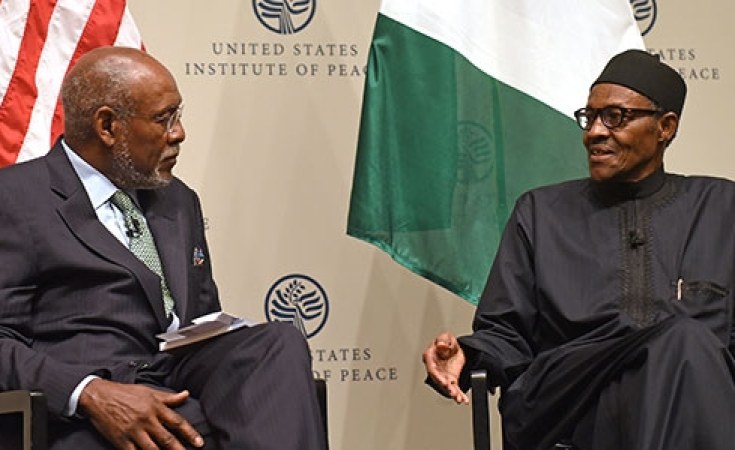Following is the text of the 'Leahy Law' - Section 620M of the Foreign Assistance Act of 1961, as amended, a permanent standing law that governs all State Department funded aid.
Section 620M "Limitation on Assistance to Security Forces"—
(a) IN GENERAL. – No assistance shall be furnished under this Act or the Arms Export Control Act to any unit of the security forces of a foreign country if the Secretary of State has credible information that such unit has committed a gross violation of human rights.
(b) EXCEPTION. –The prohibition in subsection (a) shall not apply if the Secretary determines and reports to the Committee on Foreign Relations of the Senate, the Committee on Foreign Affairs of the House of Representatives, and the Committees on Appropriations that the government of such country is taking effective steps to bring the responsible members of the security forces unit to justice.
(c) DUTY TO INFORM. – In the event that funds are withheld from any unit pursuant to this section, the Secretary of State shall promptly inform the foreign government of the basis for such action and shall, to the maximum extent practicable, assist the foreign government in taking effective measures to bring the responsible members of the security forces to justice.
(d) CREDIBLE INFORMATION. The Secretary shall establish, and periodically update, procedures to
(1) ensure that for each country the Department of State has a current list of all security force units receiving United States training, equipment, or other types of assistance;
(2) facilitate receipt by the Department of State and United States embassies of information from individuals and organizations outside the United States Government about gross violations of human rights by security force units;
(3) routinely request and obtain such information from the Department of Defense, the Central Intelligence Agency, and other United States Government sources;
(4) ensure that such information is evaluated and preserved;
(5) ensure that when an individual is designated to receive United States training, equipment, or other types of assistance the individual's unit is vetted as well as the individual;
(6) seek to identify the unit involved when credible information of a gross violation exists but the identity of the unit is lacking; and
(7) make publicly available, to the maximum extent practicable, the identity of those units for which no assistance shall be furnished pursuant to subsection (a).
The National Defense Authorization Act for FY2015 amended Title 10 of the U.S. Code by incorporating the Leahy Law for all assistance funded out of the Defense Department budget.
10 U.S. Code Sec. 2249e – Prohibition on use of funds for assistance to units of foreign security forces that have committed a gross violation of human rights
(a) In General.—
(1) Of the amounts made available to the Department of Defense, none may be used for any training, equipment, or other assistance for a unit of a foreign security force if the Secretary of Defense has credible information that the unit has committed a gross violation of human rights.
(2) The Secretary of Defense shall, in consultation with the Secretary of State, ensure that prior to a decision to provide any training, equipment, or other assistance to a unit of a foreign security force full consideration is given to any credible information available to the Department of State relating to human rights violations by such unit.
(b) Exception.—The prohibition in subsection (a)(1) shall not apply if the Secretary of Defense, after consultation with the Secretary of State, determines that the government of such country has taken all necessary corrective steps, or if the equipment or other assistance is necessary to assist in disaster relief operations or other humanitarian or national security emergencies.
(c) Waiver.—The Secretary of Defense, after consultation with the Secretary of State, may waive the prohibition in subsection (a)(1) if the Secretary determines that the waiver is required by extraordinary circumstances.
(d) Procedures.—The Secretary of Defense shall establish, and periodically update, procedures to ensure that any information in the possession of the Department of Defense about gross violations of human rights by units of foreign security forces is shared on a timely basis with the Department of State.
(e) Report.—Not later than 15 days after the application of any exception under subsection (b) or the exercise of any waiver under subsection (c), the Secretary of Defense shall submit to the appropriate committees of Congress a report—
(1) in the case of an exception under subsection (b), providing notice of the use of the exception and stating the grounds for the exception; and
(2) in the case of a waiver under subsection (c), describing--
(A) the information relating to the gross violation of human rights;
(B) the extraordinary circumstances that necessitate the waiver;
(C) the purpose and duration of the training, equipment, or other assistance; and
(D) the United States forces and the foreign security force unit involved.
(f) Appropriate Committees of Congress Defined.—In this section, the term "appropriate committees of Congress" means—
(1) the Committee on Armed Services, the Committee on Foreign Relations, and the Committee on Appropriations of the Senate; and
(2) the Committee on Armed Services, the Committee on Foreign Affairs, and the Committee on Appropriations of the House of Representatives.


